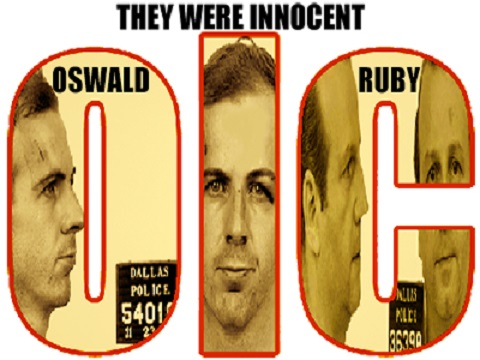There is a discrepancy: Ruby's account of what he saw differs from what Pierce and company said they did. Your resolution is to assume that Ruby saw all that Pierce and them said but chose not to report it. And that is totally unwarranted, unjustified, illogical, and it won't pass muster on my watch. There is an implication to what Ruby said, not an assumption but an objective implication: that Ruby saw Pierce and Vaughan and no one else connected with that car. Furthermore, Ruby is dead, and YOU don't speak for him. If anybody speaks for him, I speak for him, because I defend him. This was a man who pleaded with Earl Warren to let him take a polygraph test because he wanted to prove that he was being truthful. He knew that some questioned how he reached the ramp. Describing what he saw at the ramp was his way of establishing that he was really there. And on that basis, if he had seen an officer sitting next to Pierce, he DEFINITELY would have said so.
Today, my InfoWars presentation went up in which I demonstrated that there is no image of the real Jack Ruby in that garage during the spectacle. And it will impress people. Not you, and your kind of people, but other people. Obviously, Jerry Corsi, the anchor at Infowars was impressed. And I was told that Alex Jones personally watched the presentation and approved its publication on InfoWars. That's what Jerry told me. So, obviously, Alex was impressed. But, the point is that if Ruby wasn't in the garage during the spectacle, and he wasn't, but he was in the garage at some time, and said he was, then ipso facto, it had to be a different time. That follows from the logic of the situation. So, there is solid logical ground on which to make the claim that Pierce made the trip twice, once alone when Ruby saw him, and once shortly before the spectacle when he had two other officers in the car.
And then, glibly, you say that three officers in the car, one officer on foot, and a fifth man who was unofficially helping out, a former officer named NJ Daniels, and none of those 5 saw Ruby even though it was a narrow ramp?
Well, we can test that too, Sparta. We can put 5 test subjects there, just the way they were. Then we can have a Ruby proxy walk down the ramp. Of course, we would instruct the 5 that their purpose was to make sure nobody goes down the ramp, that they should be on keen lookout for it, and stop anyone who tries to walk down. And we'll see how many times the Ruby proxy gets down the ramp without being seen by any of the 5. Then we'll see the essence of your glib statement, "That's right. None of them saw him."
Anyone can say anything, Sparta. Anyone can type any keys on the keyboard. And the truth is that I don't need you to do that experiment. I can just do it. And it can be done elsewhere. Five people in a small confined space; a 6th person walks by them, and even though all 5 have their radar up to keep all persons out, none of them see him. Five people in a small confined space; a 6th person walks by them, and even though all 5 have their radar up to keep all persons out, none of them see him. We'll see how that plays in Peoria.

No comments:
Post a Comment
Note: Only a member of this blog may post a comment.